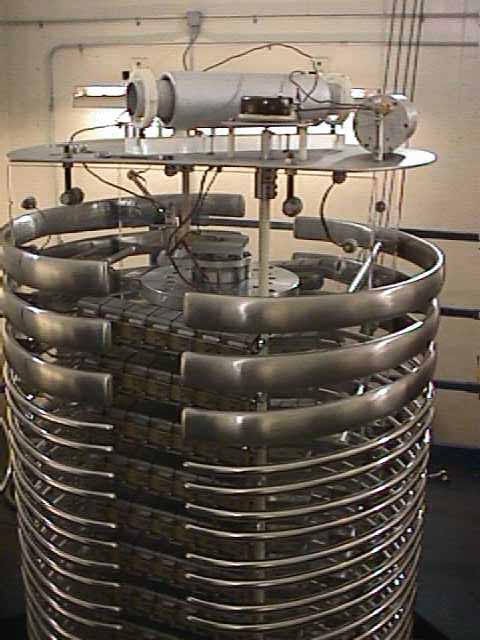
Advance warning: This post deals is a bit more metaphysical than most, and ventures a bit into quantum theory. It's also a bit lengthy, but worth the read, IMHO. You've been warned.
+ + + + + +So, I've been thinking a bit about life. I would say lately, except that this has been a favorite topic of mine to ponder since before I was ten years of age. But I digress. I've come to the conclusion that, if there is any cosmic purpose to any of our individual lives, or even for us collectively as a species, it is this:
Purpose of species: Procreate, reproduce, evolve and generally self-replicateOne could argue that, as it says somewhere in the Bible, the whole purpose of our species is really just to be a good shepherd to the flock of other non-human living things on this planet.
Well, shepherds tend to lead their flocks to different places from time to time, so that fact doesn't necessarily derail my train of thought much by itself. Let's continue with this thought experiment and see where it leads, shall we?
If we were all to follow this cosmic guidance and just pro-create to our hearts content, we might eventually find ourselves with a planet that is rather full of human beings. What's this? We're already in that situation? Oh dear. Well, that brings us to our first limit, then:
Limit: One planet, already overpopulated
So, if our planet is already just teeming with human life, which represents mouths to be fed, brains to be kept entertained, and arses to be driven around in big gleaming automobiles requiring some sort of fuel for propulsion... well, that's an awful lot of resources that this population is demanding to support their day-to-day life. At some point, this combination of population plus required resources is going to run up against the reality of a finite amount of available resources on this one planet. And, because we've all collectively made the startlingly good decision to keep the generally high quality of our lives high (we have, after all, made that decision, haven't we?), we probably don't want to go about ruining our quality of life by mucking up our own planet so badly that it's no longer pleasant to live here. That brings us to our second limit:
Limit: Must not destroy home planetStephen Hawking
has said that we should colonize space, basically as an insurance policy for the survival of our species, given all the generally bad things (war, disease, nuclear power & weapons, FOX News, etc.) that happen on Earth. I wouldn't quite put it that way. Rather, I think it is our destiny to colonize space. It's part of "go forth and multiply." Once we've begun to near the limits for human habitation of this planet (and I believe that we are reaching that point, or will within a couple more centuries anyways, if we manage somehow to make it that far as a species), it just seems rather logical to make that next leap and go out into space. It's like when you go out to a really crowded dance club, you meet some really attractive member of the
opposite sex (remember: procreation), and you both decide collectively to bounce out to someplace a little more quiet. There really isn't enough countryside for the entire species to just go off and get some quiet place in the countryside to live out the rest of our existence, and besides, the existing residents of the countryside (especially those of the non-human persuasion, such as the animals) might object.
That leaves us, collectively, with our first solution, involving the colonization of places that are not on Earth where we might be able to have a little bit of peace and quiet:
Solution: colonize outer space.I'm talking long-term here. Not next week, obviously, and not just because I've already got other plans for next week. No, I mean, this is a really long-term goal, kind of like JFK saying that we needed to land a man on the moon... he said that in, what, 1961? It took us the rest of the decade to do it. This would probably take a bit longer.
However, we don't want the effort to colonize outer space to itself become the death knell for the rest of us back here on Planet Earth. If we were to use, say, the Space Shuttle -- or indeed, any solid- or chemical- based rocket program -- as the vehicle necessary to establish such a large presence in space, that would not be a very good thing for our environment. The carbon dioxide emissions (hello, greenhouse gasses!), other pollution, fuel consumption -- it all just sort of would start to add up, now wouldn't it? That brings us to our third limit:
Limit: To colonize other planets would seem to require many trips into space, each of which creates an awful lot of carbon dioxide & other greenhouse gases & pollutants, thus contributing to global warming and said destruction of home planetSo, we've got to figure out some way to get our species (collective arses) off the planet without creating a whole lot of pollution, greenhouse gasses, etc. There have been a number of proposals over the years as to how we might accomplish this, but recent momentum seems to have been in the direction of this: Put passengers and cargo into a capsule. Attach the capsule to a cable. One end of the cable is attached to the earth. The other is attached to an anchor object outside of the reach of Earth's gravity. The capsule pulls itself up the cable, and voila! Its' contents are in orbit. This brings us to our second solution:
Possible solution: A space elevator
Of course, you're probably thinking to yourself about now, "Well, that sounds like a pretty stupid idea. Wouldn't the damn thing just fall out of the sky after a while?"
Yes, that would seem to be the case, which brings us to another limit:
Limit: What does the space elevator anchor to in space?Well, the space elevator would need to anchor to something far enough up in space that it is sufficiently free of the earth's gravity to say up there for a while. It's got to be something with a lot of mass -- like a space station, perhaps -- to hold up the cables. However, after a while, even if the object were quite massive, and located some distance from Earth, it would seem that the fact of the cables themselves might eventually act to start tugging it back towards Earth. This brings us to another limit:
Limit: The cable would probably tug this object back into orbit eventually, and thus back onto the planet. Big collision, large impact, not good news for the space program or previously-stated goal of colonizing other planets.Of course, there's a pretty obvious solution here: Why not just fire some thrusters every once in a while to provide a course correction to the space station so that it remains in orbit, and doesn't slowly plunge back in the general direction of Earth's gravity well?
Potential solution: Fire thrusters to provide course corrections often enough to keep the anchor object (space station) up in space and not plummeting towards the ground.Thrusters, however, would seem to require a fuel supply. Fuel, as you may have noticed in the news lately, seems to be running a bit short on the good ole' planet these days. So, even assuming we could just toss a few drums of fuel onto the space elevator and pop them up to the space station frequently enough to keep it in orbit and out of the atmosphere, this wouldn't seem to represent the most sustainable possible solution, now would it? This would seem to represent another limit:
Limit: Fuel must be used to power the thrusters, fuel might be in short supply in orbit, it sure seems to be in short supply down here.But what if the fuel didn't need to be brought up from earth? After all, this space station could probably erect a rather vast solar panel array, given the vastness of space, the general lack of gravity, etc. And, according to Einstein, it is possible to convert
power into mass (E=mc^2), and indeed, this has already been done by scientists with particle accelerators. So, the space station could collect solar power, and using a particle accelerator, convert this energy into the thrust necessary to keep the space station in orbit. Sounds like a solution to me:
Possible solution: Use solar power. Convert power into mass (E=mc^2) using a particle accelerator, and use this as the thrust to keep the space station in orbit.
Great, so now we're in orbit. Now what?
Space travel. We could build giant colony-ships in orbit, using materials both brought up from Earth on the space elevator, and mined on the Moon (I hear it's rich in Titanium. That's a good thing, because titanium not only makes great bicycles, it also makes great airplanes and spacecraft). These colony-ships would create their own gravity (likely
by rotating), grow their own food, recycle their own water -- and be large enough to combat the problems of a closed environment that were encountered in the
Biosphere 2 project in Arizona. In a sense, they would have to be be colonies unto themselves, capable of sustaining not only their initial human population, but also any increases in that population (and its supporting animal companions) due to aforementioned reproduction.

These colony-ships would also have to travel through space a very long distance to reach other planets outside of our solar system, and to do so, they would have to get moving very fast. How fast? Between 0.99 and 0.999% of the speed of light (speed of light =
c) would be ideal, or even faster. You see, no object can travel
faster than the speed of light. But, objects can,
in theory, be made to travel very close to the speed of light. If we wanted to visit the nearest star system, Alpha Centauri, which is four light years (a light year is the distance that light can travel during one year) from Earth, it would take us a bit more than four years travelling at 0.99
c (could be closer to five, what with acceleration, deceleration and all). However, that's the time that us folks back on Earth would perceive it as taking. For the folks on the ship, it would seem to be a lot quicker of a journey. At 0.99
c, there would be a "time dilation factor" of seven, so the astronauts would only experience seven months if they could make the whole journey at speed. At 0.999
c, the time dilation factor would be twenty, and if the trip were made entirely at speed, it would only take about a month.
Of course, the trips would take longer, because who knows how long it might take to accelerate up to the speed of light, then decelerate back down from it?
Also, just because Alpha Centauri is the closest star, doesn't mean that we really have any reason to go there. We might need to hike quite a longer distance through space to reach a suitable star system where we might be able to construct a colony. Some have argued that we should try colonizing the Moon and Mars first, to get a taste for the necessary technology. I've got no objection to that, but why stop there?
After all, this is the species that gave Jimi Hendrix and the Beatles to the universe. I think we're worth saving and replicating elsewhere, don't you?






































